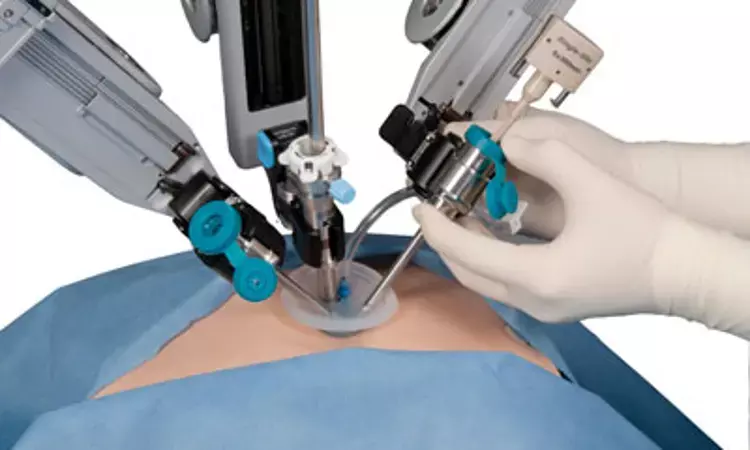- Home
- Medical news & Guidelines
- Anesthesiology
- Cardiology and CTVS
- Critical Care
- Dentistry
- Dermatology
- Diabetes and Endocrinology
- ENT
- Gastroenterology
- Medicine
- Nephrology
- Neurology
- Obstretics-Gynaecology
- Oncology
- Ophthalmology
- Orthopaedics
- Pediatrics-Neonatology
- Psychiatry
- Pulmonology
- Radiology
- Surgery
- Urology
- Laboratory Medicine
- Diet
- Nursing
- Paramedical
- Physiotherapy
- Health news
- Fact Check
- Bone Health Fact Check
- Brain Health Fact Check
- Cancer Related Fact Check
- Child Care Fact Check
- Dental and oral health fact check
- Diabetes and metabolic health fact check
- Diet and Nutrition Fact Check
- Eye and ENT Care Fact Check
- Fitness fact check
- Gut health fact check
- Heart health fact check
- Kidney health fact check
- Medical education fact check
- Men's health fact check
- Respiratory fact check
- Skin and hair care fact check
- Vaccine and Immunization fact check
- Women's health fact check
- AYUSH
- State News
- Andaman and Nicobar Islands
- Andhra Pradesh
- Arunachal Pradesh
- Assam
- Bihar
- Chandigarh
- Chattisgarh
- Dadra and Nagar Haveli
- Daman and Diu
- Delhi
- Goa
- Gujarat
- Haryana
- Himachal Pradesh
- Jammu & Kashmir
- Jharkhand
- Karnataka
- Kerala
- Ladakh
- Lakshadweep
- Madhya Pradesh
- Maharashtra
- Manipur
- Meghalaya
- Mizoram
- Nagaland
- Odisha
- Puducherry
- Punjab
- Rajasthan
- Sikkim
- Tamil Nadu
- Telangana
- Tripura
- Uttar Pradesh
- Uttrakhand
- West Bengal
- Medical Education
- Industry
Laparoscopic surgery for colorectal emergencies improves outcomes, Finds study

Laproscopy procedure has become the gold standard for For high-risk patients undergoing Holmium laser enucleation of the prostate (HoLEP), spinal anesthesia (SpA) affords a safe and efficient alternative to general anesthesia (GA).
Patients managed for lower urinary tract symptoms with HoLEP (n=300) in SpA with ASA>2 (n=100), GA with ASA>2 (GA-high-risk) (n=100) or GA with ASA≤2 (GA-low-risk) (n=100) were included.
Propensity-score-matching was applied.
SpA offered a comparable functional outcome to GA.
SpA provided greater hemodynamic stability, faster overall postoperative recovery with preferable pain management. organ systems, with some of the most common being reproductive (particularly gynecological) and digestive (as for cholecystectomy). Significant improvements in surgical training, as well as developments of instruments, imaging, and surgical techniques, have made laparoscopic surgery safe and feasible across different medical fields.
Laparoscopy is superior to open surgery for elective colectomy, but its role in emergency colectomy remains unclear. Previous studies were small and limited by confounding because surgeons may have selected lower-risk patients for laparoscopy.
Laparoscopic surgery for colorectal emergencies appears to improve outcomes compared with open surgery, suggests a recent study published in the Surgery Journal.
George C. Linderman and associates from the Department of Surgery, Yale School of Medicine, New Haven, CT therefore studied the effect of attempting laparoscopy for emergency colectomies while adjusting for confounding using multiple techniques in a large, nationwide registry.
During the span of four years, the authors identified emergency colectomy cases. The researchers first compared outcomes between patients who underwent laparoscopic versus open surgery, while adjusting for baseline variables using both propensity scores and regression.
Next, a negative control exposure analysis was performed. By assuming that the group that converted to open did not benefit from the attempt at laparoscopy, they used the observed benefit to bound the effect of unmeasured confounding.
The research showed that of 21,453 patients meeting criteria, 3,867 underwent laparoscopy, of which 1,375 converted to open. In both inverse probability of treatment weighting and regression analyses, attempting laparoscopy was associated with improved 30-day mortality, overall morbidity, anastomotic leak, surgical site infection, postoperative septic shock, and length of hospital stay compared with open surgery. These effects were consistent with the lower bounds computed from the converted group.
Hence, the authors concluded that "laparoscopic surgery for colorectal emergencies appears to improve outcomes compared with open surgery."
The benefit is observed even after adjusting for both measured and unmeasured confounding using multiple statistical approaches, thus suggesting a benefit not attributable to patient selection, they further added.
For further reading, log into:
https://doi.org/10.1016/j.surg.2021.06.048
Dr. Nandita Mohan is a practicing pediatric dentist with more than 5 years of clinical work experience. Along with this, she is equally interested in keeping herself up to date about the latest developments in the field of medicine and dentistry which is the driving force for her to be in association with Medical Dialogues. She also has her name attached with many publications; both national and international. She has pursued her BDS from Rajiv Gandhi University of Health Sciences, Bangalore and later went to enter her dream specialty (MDS) in the Department of Pedodontics and Preventive Dentistry from Pt. B.D. Sharma University of Health Sciences. Through all the years of experience, her core interest in learning something new has never stopped. She can be contacted at editorial@medicaldialogues.in. Contact no. 011-43720751
Dr Kamal Kant Kohli-MBBS, DTCD- a chest specialist with more than 30 years of practice and a flair for writing clinical articles, Dr Kamal Kant Kohli joined Medical Dialogues as a Chief Editor of Medical News. Besides writing articles, as an editor, he proofreads and verifies all the medical content published on Medical Dialogues including those coming from journals, studies,medical conferences,guidelines etc. Email: drkohli@medicaldialogues.in. Contact no. 011-43720751


